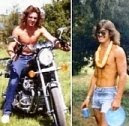I have fallen behind -- sort of
severely -- on my reading. The reason is because of too much devotion to
"trigger time," as illustrated by the Colt Model 1911 Combat Commander in .38
Super caliber. I managed to read, "Julius Winsome," by Gerard Donovan during
the past week, but still have, "The Maze at Windermere," by Gregory Blake Smith
to go. Sooner or later .... I expect .... Smith, incidentally, teaches American
literature and creative writing at Carleton College in Northfield, Minnesota,
just a few miles down the road from my present place of existence.
"The bullets flying & they're taking toll"
This is not a book
review, although, at times, it might take on the appearance of one. It is sort
of the fulfillment of a promise I made some time ago to read the novel, "Julius
Winsome," and write my thoughts about it.
"Winsome" (the novel), was
composed by an Irish writer, Gerard Donovan, who lives in England and teaches
at the University of Plymouth. Winsome (the protagonist), is a 51-year-old man
who lives alone in the woodlands of Maine in a cabin lined with shelves holding
3,282 books collected by his father, who has been dead for about twenty years,
and whose only companion is a dog named Hobbes. When Hobbes is deliberately
shot and killed, Winsome's immediate reaction is to begin
killing hunters using his grandfather's World War I rifle.
Winsome has always lived in the
same dwelling and has had minimal exposure to women. His mother had died when
he was born and he openly blames himself for her death; he believes death is
death with nothing beyond; his grandfather had killed a number of men during
World War I and was haunted by it; his father had served during World War II; he had a brief
sexual affair with a woman who mysteriously appeared at his home one day, but
soon returned to her "normal" life in a nearby town; his father had taught him
how to shoot the grandfather rifle, but Winsome did not hunt and had only killed two
animals with it during his life -- a wounded fowl and a crippled fox.
Overtly, it is the lost dog and
the lost woman which send Winsome over the edge and, no doubt, they are the most
immediate reasons he embarks on a murderous path. But -- and that is a big but
-- because the guy has so many mental issues to cope with I think it
unbelievable that he did not crack long before he actually did.
If you think you display
tendencies of paranoia, read this book and you see a man who truly is gripped
by it. There are times when he sits in his cabin without light or fire
thinking/believing police are surrounding it and waiting for the right moment
to shoot him.
The book ends with Winsome
walking along a woodland trail toward the nearest town to give himself up to police,
which leaves a number of questions unanswered and which is a lazy, dismal way
to end a story .... in my opinion ....
The greatest flaw of the novel
is the author's lack of knowledge about firearms. He is constantly confusing
elements of rifles and shotguns and looks somewhere between foolish and idiotic
in that regard. Since such misperception is common enough among Americans, it
is (and was) no surprise to find it coming from an Irishman living in England.
It did sort of spoil the story for me in many ways, though.
On the positive side, Donovan
is a master craftsman with words and writes in a poetic style, which I fancy. A
unique element to the book is how the author incorporates the use of Elizabethan
English into the story: "Thus every week I increased my vocabulary by twenty or
so Elizabethan words, words come all the way from the 1500s to sit in my mouth
and in my hand when I spelled them with their definitions. I remembered one
day's set: Blood-boltered meant
covered with blood, besmoiled meant
covered with dirt."
In passing, I will mention two
other novels which this tale brought to mind. O.E. Rolvaag wrote, "Giants in
the Earth," published in Norwegian in two parts in 1924 and 1925. It was later
translated into English. A young Norwegian couple, Per and Beret Hansa,
homestead on the prairie of Dakota Territory in 1873. The snow storms, locusts,
poverty, hunger, loneliness, homesickness and the difficulty of fitting into a
new culture gradually push Beret over the brink into madness and, in a sense,
this leads to her husband's death.
A 1974 novel, "Centennial,"
written by James A. Michener, one of my "gods" of contemporary literature,
describes an event in the life of Alexander McKeag when he "wintered" alone in
the American mountain wilderness during the early years of the Nineteenth Century.
Sheltering from a true blizzard in a sort of a cave/dugout, McKeag nearly goes
insane imagining that he will never get out and is doomed to die there. He "claws" his way out through the snow and
discovers the storm has ended and the sun is shining. Unlike Winsome and Beret,
he survives the experience with no harm coming to himself or to others and goes on to return
to civilization, which is to say returns to significant human contact, and
lives a long, productive life.
I would recommend either of those
books far ahead of "Winsome," but Donovan's novel is not many more words/pages than a
lengthy short story and not many hours need be invested in completing it.
















No comments:
Post a Comment